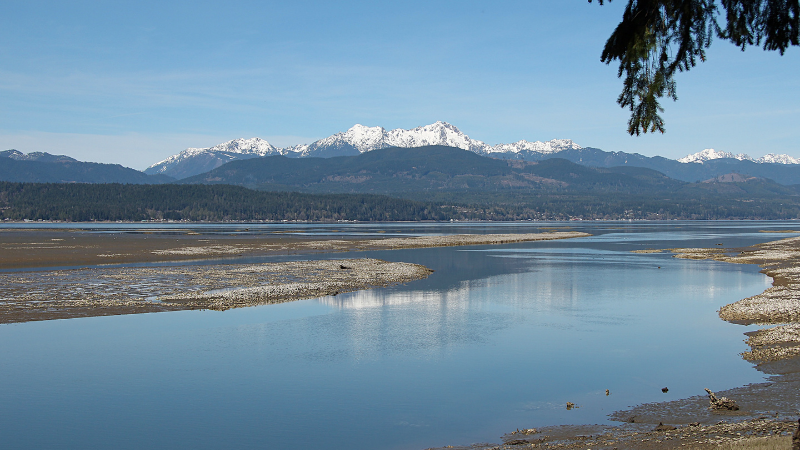
Washington is a land of endless beaches, snow-capped mountains, flowing rivers, and abundant forests. The state’s farmlands feed millions. Puget Sound is home to orca, the salmon they depend on, and the fish and shellfish that feed the marine economy.
To preserve the environment, to protect the Washington we know and love, we need to take urgent action.
At Ecology, our legislative agenda and Gov. Jay Inslee’s proposed budget offer key investments that will help bolster our work to recover salmon populations, protect Washington waters, and act on climate change.
Some highlights of our requests for the 2022 supplemental budget and our agency legislative agenda include:
Salmon recovery funding proposal
Many of Washington’s salmon runs are threatened, putting at risk the Southern Resident Killer Whales that depend on them for their primary food source, and the state’s Tribal, commercial, and recreational fisheries. The Governor’s budget proposal includes resources to protect Washington waters, rebuild salmon populations, and restore habitat. The proposed investments accelerate improvements to water quality by investing in clean water infrastructure and reducing nutrient pollution in state waters. Also included is funding to build green infrastructure to decrease stream and river temperatures, and to accelerate toxics cleanup from industrial and contaminated sites.
Clean water infrastructure
Salmon and people need clean, cool water to thrive. Our two proposed infrastructure bills address water quality and habitat:
Waste Water Permit Fees
We’re proposing changes to our Wastewater Permit Fees , which would provide added capacity to ensure wastewater treatment facilities are functioning properly and protecting streams, rivers, and Puget Sound. This bill also removes an outdated cap on municipal wastewater fees so Ecology can work with utilities on a fee structure to adequately support communities with their permit needs.
Water Power License Fees
Hydropower dams provide critical carbon-free energy to Washington, but their operations have the potential to impair habitat, harm water quality, and damage fish survival by increasing water temperatures and sediments; reducing oxygen levels and total dissolved gas; and the potential for leaks or spills.
Fees assessed on the water rights to produce energy provide 55% of the funds that Ecology and Dept. of Fish and Wildlife need to support hydro power facility operators with certifications, permitting, and federal regulation compliance. Funding in current law for this work will expire on June 30, 2023. If this funding ends, state agencies will have limited capacity to support dam certification and protect the state’s people, fish, and wildlife.
Our agency request legislation would eliminate the June 30, 2023, sunset, maintaining necessary funding for state agencies to provide oversight of hydropower facilities.
Addressing climate change
In 2020, the Washington Legislature set new greenhouse gas emission limits in state law, requiring total emissions to fall 95% by 2050, which is in line with research on the reductions needed to prevent the worst effects of climate change. Our proposed legislation addressing emissions-intensive, trade-exposed industries will help Washington meet those limits, while sustaining a robust industrial and manufacturing economy in Washington.
Water supplies and drought response
In recent years, severe droughts have created hardships for farmers, ranchers, and rural landowners. These droughts also raised water temperatures, killing thousands of salmon, sturgeon, and other fish and wildlife. Some rural drinking water supplies literally dried up, requiring water to be hauled in by trucks to meet even basic sanitation needs for the affected small communities. Ensuring Ecology can respond more quickly and effectively to future droughts is critical with anticipated increased frequency of droughts in the future.
We're requesting authorization to respond earlier to drought declarations and to provide ongoing and readily available funding to prepare and respond to drought emergencies, including unanticipated and sudden droughts.
Modernizing state planning for oil and hazardous substance spills
Tribal participation is critical to the success of Washington’s work for oil and hazardous substance spill prevention, contingency planning, and response coordination. Tribes have expertise and knowledge that improves geographic response planning, and many Tribes have resources dedicated to oil and hazardous substance spill response.
We're proposing an update to RCW 90.56.060 concerning the Statewide Master Oil and Hazardous Substance Spill Prevention and Contingency Plan. The proposed amendments will formally acknowledge the contributions Tribes make to every aspect of the state’s planning process, not just in responses.
This proposed change would add federall- recognized Tribes — with interests in spill prevention, preparedness planning, and response — to the list of groups Ecology will seek input from when updating the statewide master plan for oil spills.
Washington’s environment is worth protecting, preserving, and restoring. We’re hopeful for the potential to advance our 2022 environmental priorities. To read more about our agency request legislation, please visit ecology.wa.gov/2022priorities.

